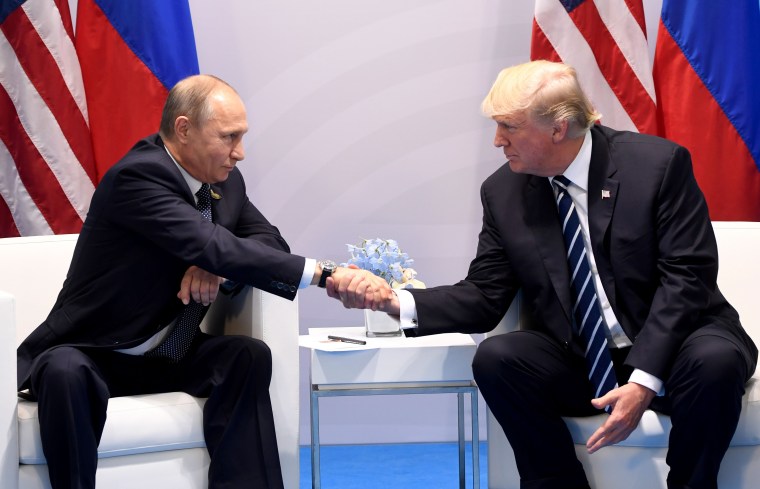A couple of weeks ago, Politico reported that Donald Trump loyalists on Capitol Hill are "losing patience with Republican leaders over the wide-ranging Russia probes creeping into his inner circle." Trump devotees, the article added, are outraged with GOP leaders for "allowing" the investigation into the scandal to continue.
As the Washington Post's Greg Sargent marveled at the time, "Remarkably, these Trump-allied Republicans are explicitly asserting that GOP leaders are betraying Trump by failing to squelch ongoing efforts to get to the bottom of a hostile foreign power's apparent sabotage of our democracy, in addition to the possibility of Trump campaign collusion with it."
The pressure hasn't abated. The Washington Post published an op-ed last week from Rep. Adam Schiff (D-Calif.), the ranking member on the House Intelligence Committee, on the efforts to conclude the probes.
[Despite recent discoveries], there are growing calls from the White House and outside parties aligned with the president to halt the congressional investigations rather than allow the evidence to dictate the pace and breadth of our inquiry. The White House may hope it can prematurely end the congressional probes and then apply pressure to wrap up special counsel Robert S. Mueller III's work as well.This would be a terrible subversion of justice. But already these efforts are having an effect, as some witnesses are being rushed before Congress without regard for best investigative practices, sometimes out of order or before we obtain documents necessary to question them. Still other witnesses, essential to laying the foundation for the more significant interviews, have yet to be invited before the committee.
The president himself is helping lead the charge. At a White House event on Monday, Donald Trump called for an "end" to the investigations, adding, "I think the American public is sick of it,"
A CNN report added yesterday that a "growing number of key Republicans" are pushing congressional leaders to wrap up the probe, insisting that the examination of last year's events shouldn't extend into 2018.
This is absurd for a variety of reasons, but for now, let's focus on two. The first problem is the partisan instinct that leads some GOP officials to put Trump's interests above the country's. A foreign adversary launched an espionage operation against American elections, creating the most serious attack on the United States since 9/11. It's critically important to understand what happened, how it happened, whether Russian operatives had domestic confederates who helped make it happen, and what officials can do to prevent it from happening again.
If your response to the attack is, "Let's not look too closely or for too long," your priorities are in need of re-examination.
Second, the idea that congressional Republicans are uncomfortable with a prolonged, multi-pronged investigation is curious given their recent record. After the deadly attack in Benghazi that left four Americans dead, GOP lawmakers launched multiple investigations spanning more than three years.
The congressional scrutiny lasted longer than the investigations into Pearl Harbor, 9/11, the Kennedy Assassination, and Watergate. The House Intelligence Committee, the Senate Intelligence Committee, the House Armed Services Committee, and the State Department's independent Accountability Review Board each published reports on Benghazi. The attack was further examined by the Senate Armed Services Committee, the Senate Homeland Security Committee, the House Oversight Committee, the House Foreign Affairs Committee, and a special Select Committee that didn't complete its work until 2016.
And yet, after Russia took steps to elect their preferred American presidential candidate, many of these same Republicans are suddenly in a rush? They've suddenly lost their appetites for careful examinations of an attack?
Please.
Postscript: Though he's since resigned, former House Oversight Committee Chairman Jason Chaffetz (R-Utah) admitted a while back that he intended to spend at least a year -- after the election -- looking into Hillary Clinton's email server protocols. Republicans now, however, are reluctant to invest that same amount of time investigating the Russia scandal.
